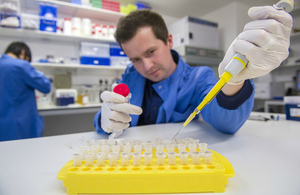Genetic lego: a step-change in DNA engineering
Oxford Genetics develops the world's first flexible genetic engineering platform with support from Innovate UK.

Oxford Genetics company
In the cutting edge field of genetics research, modifying and assembling DNA is often an expensive and time-consuming process.
Dr Ryan Cawood - Managing Director of Oxford Genetics recognised the frustrations of fellow scientists and set out to tackle the problem:
“I did my PhD at Oxford University in biogenetic engineering studying cancer viruses, but I found it really difficult to find what I needed; even fairly standard bits of DNA took some tracking down.”
Ryan wanted to develop a more cost effective and flexible platform that scientists could use to carry out DNA research.
But before he could get his business opportunity off the ground, he needed to prove the concept.
Snap Fast - the flexible friend
In 2011 Ryan entered a Smart competition run by Innovate UK. With the help of a £24,000 award, plus £35,000 he raised himself, he set about demonstrating how the idea would work.
For most research purposes DNA needs to be engineered in order to be useful. This usually involves obtaining a ‘backbone’ piece of DNA, modifying it with enzymes and joining it to other pieces of DNA.
Ryan and his team at Oxford Genetics worked from this starting point to develop a flexible genetic engineering platform called ‘Snap Fast’, which enables scientists to modify DNA to suit their research needs.
“Being able to change and swap pieces of DNA easily, without having to start again, means major cost savings for research budgets,” said Ryan.
The unique selling point of Snap Fast is the design of the DNA pieces, which interlock like Lego blocks and are fully interchangeable. Customers can either assemble themselves or buy a complete item.
“No one else has our range of products, and we expect to capture a substantial share of a very large and expanding market,” added Ryan.
Growing fast
By the end of 2014, only a year after it launched its first batch of products, Oxford Genetics expects to have a portfolio of 2,500 ready-made DNA products on the market.
Customers can buy plasmids - the basic building block of the system, more complex synthesised DNA, or order custom-made DNA.
Leading pharmaceutical companies and research establishments are already buying Oxford Genetics’ products. These include: Dana Faber, Eli Lily, Harvard University and the Massachusetts Institute of Technology. Some 80% of its sales are already overseas.
Another prestigious contract has come from Germany’s renowned Max Planck Institute. It asked Oxford Genetics to make a range of genes from the Neanderthal genome that will enable scientists to see the genetic differences between modern man and his ancient ancestor.
Staying ahead of the curve
Oxford Genetics has received two further Smart grants. The first award of £45,000 towards a total project cost of £76,000, was made for a project to develop a unique algorithm that will identify whether a specific DNA sequence is optimal for a customer’s needs.
“It’s been a steep learning curve but I have no regrets; the alternative would have been to accept a post-doctoral position working for someone else,” said Ryan.
“Instead, I’m running my own company and bringing about a step-change in genetic technology - without support from Innovate UK it would never have happened.”
Updates to this page
-
First published.